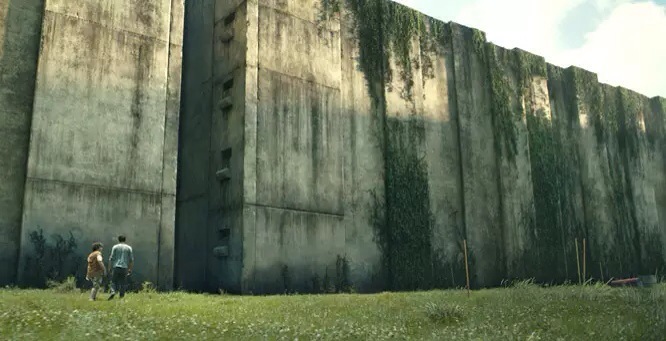“Freedom Is Slavery” — 1984
If James Dashner didn’t read The Lord of the Flies and watch The Matrix Reloaded shortly afterwards, then there surely is universal unconsciousness because those two fictions are the undercurrent of The Maze Runner.
Unlike most YA films which pit unruly or fashionably undesirable younglings against a slew of problems, The Maze Runner dispenses the atypical love story and trades in for social commentary and political dissension. Team Jacob and Peeta-verses-Gale have no place in Wes Ball’s entertaining Runner adaptation. Thank god for that!
Mimicking The Lord of the Flies‘ apocalyptic backdrop, The Maze Runner sets a group of adolescents against a real symbol for life, i.e. a giant maze. Kubrick already gave us the best labyrinth in film history in The Shining, and Nolan continued the classic, Greek maze motif in Inception. The Maze Runner consciously acts just like the images of shifting corridors and traps as the narrative opens and closes by revealing and pulling back its hidden agenda. The inexplicable arrival of the human being birthed out of the earth, set against time and physical machinations, doubles and expands the film’s meanings and conceit. Humanity is bested and trapped within systems.
The human body itself is a system of systems; Or codependent relationships that rely on the others to function optimally. Film is a system as well. It clicks it’s gears and turns levers in order for the images to be brought back to life in a shared state. All of this plays into the thematics and it is what the characters tackle and face head on. They have no idea where they are or why they are placed inside a doomed system. Only a few, like the characters in The Holy Mountain, are allowed to know exactly who and where they are and can reject their current situations. In essence, not only are the characters fighting half-mutated aberrations of flesh and technology, but they are unknowingly combating themselves. For film is crude material reproduced through electronic tech.
Freedom is the greatest illusion, even greater than film. Nobody is free. If they were, there would be no need for the law and the idea of freedom wouldn’t, and couldn’t exist. There would be no hierarchy of any kind. A person could do what they wanted without fear of reprisal.
Which is interesting because the group of mainly teenage boys in the film develops a cast system while they are trapped within the maze’s interior. Systems are developing systems within systems within systems. The creators of the film and the audience, too, help round out this connection of relationships. There is no escape. So Melville put it best, “Who ain’t a slave? Tell me that.”
Look back to last year if there needs to be further proof that we are sadistic in our wants, needs, and desires. We want to be chained, bound, and gagged. Spanked by the “father” for being bad. 12 Years a Slave reminded us that nobody can outrun what fate has in store. You will be caught and imprisoned in some aspect. Why else do we go back to see the same movie, and be told the same narrative over and over again if not to be beaten by systems. Though redundant in form, films do have conclusive victory. Life rarely does.
Well almost all films except, maybe, The Maze Runner. Ironically dressed to the hilt in postmodern garb, the film is one of the most half-finished stories that can be instantly recalled. It doesn’t solve anything (like Marvel movies), other than to lead to the conclusion that the world and it’s history is just a big, fat lie. Everything told isn’t real and none of the characters suspect any different.
Which then leads to a contradictory dichotomy and entropy of storytelling. Stories are often told for comfort and film is a means of hallucinating to leave the chains of life. That’s what escapism is. If only temporarily, there is freedom in film. But then again, one is caught up with others in the same trance and mindset and it becomes another system. But this system is one of total silence and an absolute submission to the conformity of the bright image. Like the characters at the end of The Maze Runner, not being informed and living in a lie is a form of peace. And as Orwell also wrote, Ignorance Is Strength.
However, going back on this, stories are the essence of life. They aren’t escape pods nor do they hide the truth in mirroring reflection. The truth is stories illuminate and pull back the shade of life. “Facts can be so misleading. Where rumors, true or false, are often revealing,” said Hans Landa in Inglourious Basterds. Stories aren’t the deceiver, but the liberator to ultimately live. For all things are told and retold over and over and over again and handed down to and for future generations. Life is made up of narratives and expressions. The oratory tradition is now the seduction of visual metaphors projected 50 feet high.
Now run that through the obstacle of the mind.
Something or Nothing:
Something and nothing. The Maze Runner is better than all the Twilight movies put together (not like that’s a big chore), and is more interesting than The Hunger Games franchise. The Maze Runner isn’t a great film nor is it very good, but what it addresses and explores makes it one to mull over in appreciation. It does suffer from some unnecessary aesthetics and an inconclusive finale. That being said, this is much better than expected and delivers some exhilarating scenes. Even if you’re not an obnoxious tween, it will be ok to see this and admit it to others.


